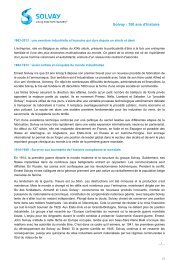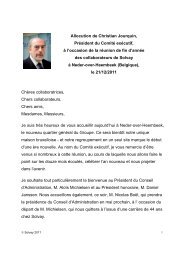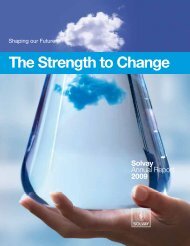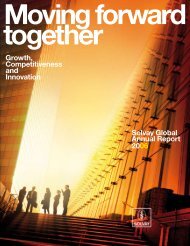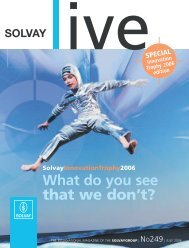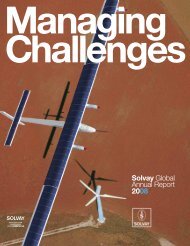Create successful ePaper yourself
Turn your PDF publications into a flip-book with our unique Google optimized e-Paper software.
136<br />
<strong>Solvay</strong> Global Annual Report 2007<br />
Terms of office and age limit<br />
Directors are appointed by the<br />
Shareholders’ Meeting for 4 years,<br />
they may be reappointed.<br />
To avoid all directorships terminating<br />
at once, a rotation was established<br />
by lot when the company was<br />
converted into a societé anonyme<br />
over 40 years ago.<br />
The age limit for membership of the<br />
Board is the ordinary Shareholders'<br />
Meeting following the member’s<br />
70 th birthday. In this case, the director<br />
in question resigns, and is replaced,<br />
for his remaining term of office,<br />
by a successor appointed by the<br />
Shareholders' Meeting.<br />
Following the recommendations of<br />
the Belgian Corporate Governance<br />
Code on the terms of directorships,<br />
the Shareholders’ Meeting decided<br />
in 2005 to shorten directors' terms of<br />
office from 6 to 4 years.<br />
4.3.3. Criteria for appointment<br />
The Board of Directors applies<br />
the following primary criteria when<br />
proposing candidates for election<br />
to directorships by the ordinary<br />
Shareholders’ Meeting:<br />
• ensuring that a substantial majority<br />
of directors on the Board are<br />
“non-executive”. At January 1,<br />
2008, 14 out of 16 directors were<br />
non-executive, and two belonged<br />
to the Executive Committee (Mr.<br />
Christian Jourquin and Mr. Bernard<br />
de Laguiche);<br />
• Belgian law and the by-laws of<br />
the company permit spontaneous<br />
candidacies for the post of director.<br />
These must be addressed to the<br />
company in writing at least 30 days<br />
before the ordinary Shareholders’<br />
Meeting. Exercise of this right is not<br />
encouraged;<br />
• ensuring that a large majority<br />
of non-executive directors are<br />
independent according to the<br />
independence, defined by law<br />
and further tightened by the<br />
Board of Directors (see “criteria<br />
of independence” below). In this<br />
respect, the independent status<br />
of 12 out of 14 non-executive<br />
directors has been recognized by<br />
the ordinary Shareholders’ Meeting;<br />
• ensuring that the members of<br />
the Board of Directors together<br />
reflect the shareholder structure<br />
and possess the wide range of<br />
competences and experience<br />
required by the Group’s activities;<br />
• ensuring that the Board of<br />
Directors’ international composition<br />
appropriately reflects the<br />
geographic extent of its activities.<br />
At January 1, 2008 the Board<br />
included members of six different<br />
nationalities;<br />
• ensuring that the candidates it<br />
presents commit to devoting<br />
sufficient time to the task entrusted<br />
to them. In this respect, attendance<br />
at Board Meetings was very high in<br />
2007;<br />
• ensuring, finally, that it does not<br />
select any candidate holding an<br />
executive position in a competing<br />
company or who is involved in the<br />
external audit of the Group.<br />
The Chairman of the Board gathers<br />
the information allowing the Board of<br />
Directors to verify that the selected<br />
criteria have been met at the time of<br />
appointment, renewal and during the<br />
term of office.<br />
4.3.4. Criteria for independence<br />
Based on Belgian law, the<br />
Board of Directors sets the<br />
criteria for determining directors’<br />
independence. Each director fulfilling<br />
these criteria is presented to the<br />
ordinary Shareholders’ Meeting for<br />
confirmation.<br />
The Board has chosen to apply in<br />
particular the following criteria:<br />
• to be viewed as independent, a<br />
director may not have exercised a<br />
significant executive function within<br />
the <strong>Solvay</strong> group or have been an<br />
executive or non-executive director<br />
of Solvac S.A. for at least three<br />
years. In this respect the Board of<br />
Directors is stricter than the law,<br />
which sets a limit of only two years.<br />
According to this criterion,<br />
Mr. Christian Jourquin and<br />
Mr. Bernard de Laguiche, as<br />
members of the Executive<br />
Committee, are not independent.<br />
Mr. Aloïs Michielsen, having<br />
been Chairman of the Executive<br />
Committee of <strong>Solvay</strong> until<br />
May 9, 2006, is not recognized<br />
as independent. The case of<br />
Mr. Charles-Casimir Lambert is set<br />
out below. He is not considered as<br />
independent. On the other hand,<br />
the executive position of Mr. Denis<br />
<strong>Solvay</strong> at the Mutuelle <strong>Solvay</strong>, the<br />
almost exclusive role of which<br />
consists of holding the Fortis and<br />
Sofina shareholdings, has not been<br />
considered sufficiently significant<br />
to jeopardize his independence in<br />
matters relevant to the Board of<br />
Directors of <strong>Solvay</strong> S.A.;<br />
• being a non-executive director<br />
of a local Group holding or<br />
administrative company has not<br />
been considered as an obstacle to<br />
independence. This is the case of<br />
Mr. Whitson Sadler, who remains<br />
a non-executive director of <strong>Solvay</strong><br />
America, Inc., the principal role<br />
of which is to house functional<br />
services shared by subsidiaries in<br />
the US. These local services are not<br />
matters falling within the remit of<br />
the Board of Directors. They do not<br />
therefore affect Mr. Whitson Sadler’s<br />
independence in matters falling<br />
within the remit of the Board of<br />
Directors, nor his role on the Audit<br />
Committee;<br />
• a director who is a major<br />
shareholder is not considered<br />
as being independent. The law<br />
considers a shareholding to be<br />
significant when it reaches or<br />
exceeds 10%.<br />
This is the case of Solvac S.A., of<br />
which Mr Charles Casimir-Lambert<br />
was a Director until May 2007.<br />
No director holds more than 1%<br />
of <strong>Solvay</strong> shares;<br />
• finally, to be viewed as independent,<br />
a director may not have business<br />
or other relations with the <strong>Solvay</strong><br />
group, for example as a customer<br />
or supplier, the nature or size of


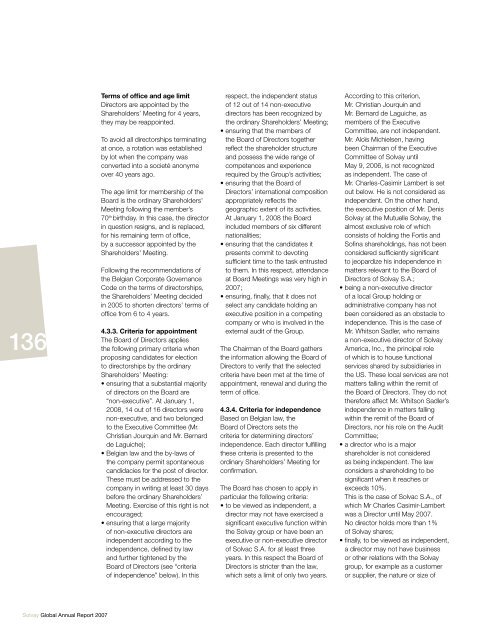
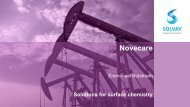
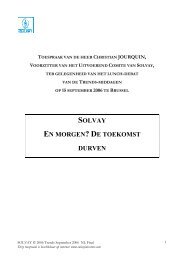
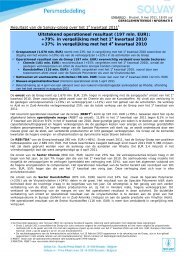
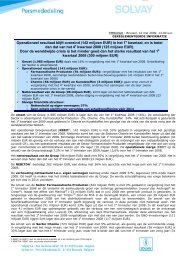

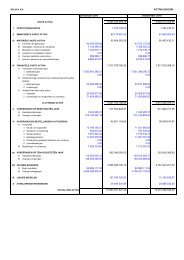
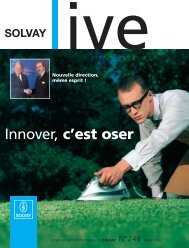
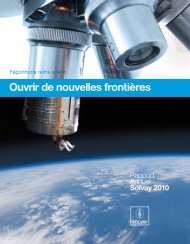
![PROC.1 [LETTRE] - Solvay](https://img.yumpu.com/16585746/1/184x260/proc1-lettre-solvay.jpg?quality=85)
